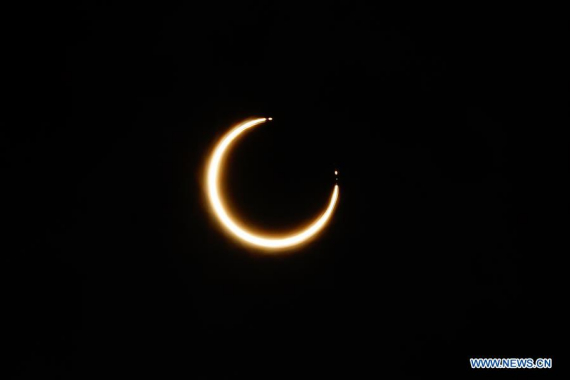
Photo taken on Feb. 26, 2017 shows a solar eclipse in Villa Manihuales, Chile, on Feb. 26, 2017. (Xinhua file photo/Pedro Vega Labra/AGENCIA UNO)
Thomas Hwang, a retina expert at Oregon Health & Science University (OHSU) Casey Eye Institute, has a critical warning for spectators out to see a total solar eclipse on Monday.
"If you look directly at the eclipse, it can burn your retina in mere seconds and can cause permanent damage," Hwang, an associate professor of ophthalmology in the OHSU School of Medicine, was quoted as saying in a web posting updated in recent days.
Oregon, in the U.S. Pacific Northwest, will be the first of 12 states in the United States to get a front row seat to observe the rare celestial event on Monday, August 21 - a total solar eclipse - where the moon completely covers the sun, and the sky goes dark in mid-daylight.
Scheduled to hit the U.S. West Coast around 10 a.m. Pacific time, there will be the most powerful "path of totality" going straight through Oregon, as it will last 2.5 minutes when the moon completely covers the sun.
The event is rare for two reasons: it will be the first total solar eclipse visible only in the United States since 1776 and the first total solar eclipse to cross the entire country in 99 years.
On his part, Hwang said the total solar eclipse can deliver a lot of energy to the center of vision, even when things seem kind of dark. He noted that most people normally would not look at the sun directly, but may not be as hesitant to look at a solar eclipse because it isn't as bright.
The damage to the eye is called solar retinopathy and it can give people a permanent blind spot; the longer the exposure, the hotter the retina gets and the more likely the damage.
"There's a simple solution: Wear the special solar eclipse safety viewing glasses to protect your eyes or use a pinhole projector," he suggested, adding that "even with the special glasses, don't look at the eclipse for a long time. Sunglasses won't cut it either - they are not nearly good enough filters."


















































